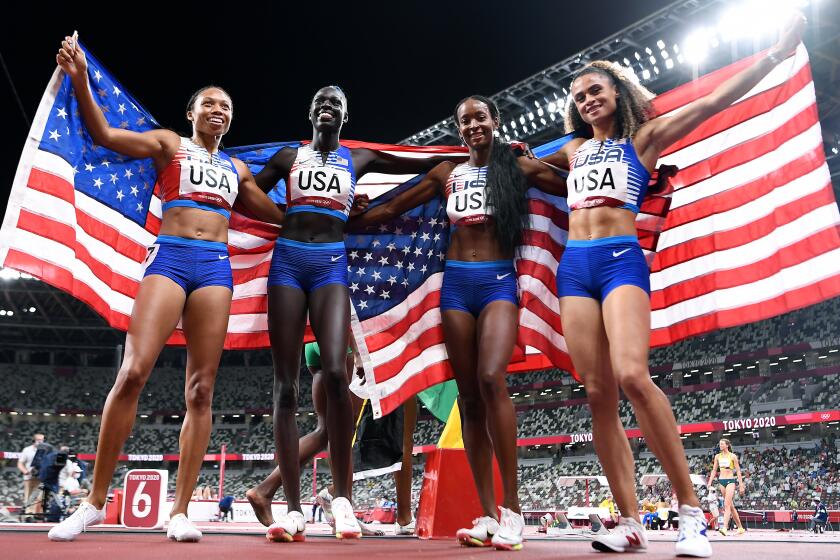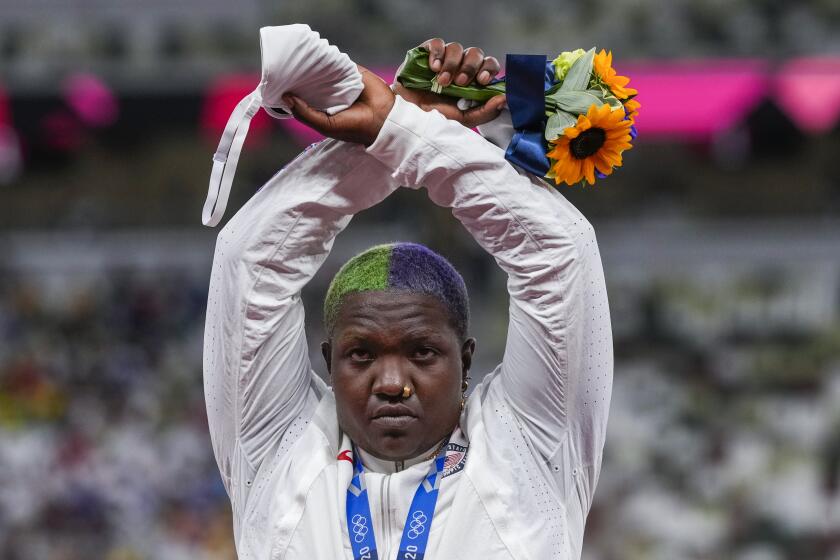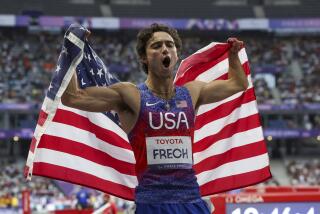Trenten Merrill strives to offer message of hope at Tokyo Paralympics
- Share via
TOKYO — Accepting that his right leg had been amputated just below the knee after a car hit him and a friend while they rode the friend’s dirt bike was difficult enough for Trenten Merrill to process as he lay in his hospital bed. An active kid who surfed and played soccer, Merrill wasn’t prepared to also lose his sense of self.
“Growing up being an athlete and having that as my identity, it was something that I felt was immediately taken away from me,” said Merrill, who was then a freshman at JSerra High but later transferred to Capistrano Valley High.
“I didn’t know what future I had as an amputee. I was asking questions to anybody that was in the room, the doctors and everyone, about what I could and couldn’t do, and they weren’t sure.”
A day after winning bronze in the 400 meters, Allyson Felix wins gold with the 1,600-meter relay team at the Tokyo Olympics. It’s her 11th medal.
His life began to take new shape when he was invited to a running clinic staged by the Challenged Athletes Foundation and Ossur, an Iceland-based company that develops and manufactures orthopedic braces and prosthetics. While there, Merrill learned about the Paralympics through conversations with several Paralympians. He also met Brazilian runner Joaquim Cruz, who had turned to coaching Paralympic track and field athletes after a distinguished Olympic career highlighted by a gold-medal triumph in the 800-meter run at the 1984 Los Angeles Games and silver in the 800 in 1988.
Those encounters planted a seed in Merrill’s mind. The seed blossomed into a goal when Cruz asked him to try some Paralympic track and field events at the U.S. Olympic and Paralympic Training Center in Chula Vista, about an hour south of where he grew up in San Juan Capistrano. There had to be something that would suit his ability and deep passion.
“I always wanted to be a professional athlete and I thought, when I lost my foot at 14, my dreams were gone,” Merrill said. “When I got invited down to the Olympic Center by Coach Cruz I realized that my dreams hadn’t died, that they were still alive. It was just a different arena. And so that lit the fire I had, wondering and questioning and trying to figure out where my life direction would go. Right when I set foot on the Olympic Training Center I knew that this was where I was meant to be.”
“It has been motivating me to persevere through this long season and is giving me feelings of renewed energy and fire.”
— Trenten Merrill
Merrill initially focused on the 100-meter dash but also tried the 200, 400, 800, discus, shotput and javelin throw while at Saddleback College. He also spent two years at Azusa Pacific. After sampling so many disciplines he decided that the long jump fit him best.
“What really attracted me was you get three tries to make a final and then you get three more tries to win,” said the 31-year-old. “I really liked the multiple bouts and efforts. A lot of times when I raced I always had a feeling of, ‘I want to do it again. I know how I can do it a little bit better.’”
It didn’t take him long to become the American record holder for the T64 category with a leap of 25 feet, 5½ inches. He finished fourth at the 2016 Paralympic Games in Rio and is hoping for better at the Tokyo Paralympics, which are scheduled to take place Aug. 24-Sept. 5. The U.S. will send a 240-person team, including six guides for visually impaired athletes.
Michael Cherry, Michael Norman, Bryce Deadmon and Rai Benjamin win the U.S. men’s track team’s first gold medal of the Tokyo Games in a running event.
Merrill plans to arrive in Japan on Tuesday. He will bring his specially designed prosthetic jumping leg and a fresh infusion of inspiration from having closely followed the Tokyo Olympics.
“It has been motivating me to persevere through this long season and is giving me feelings of renewed energy and fire,” he said. “Watching the Olympics has given me an opportunity to visualize myself competing in the stadium and provided a sense of purpose to go compete for my country, friends and family. I’m very much excited to compete and give it my all.”
Living at the Chula Vista training center has helped Merrill minimize his expenses, and he has supported himself through personal investing and working as a model and a real estate manager. He’s also a spokesman for Ossur, which has been proactive in designing sport-specific prostheses for athletes.
“One of the cool parts of being an amputee in this game for such a long time is I’ve tried Ossur’s legs as they’ve changed and developed over the years,” Merrill said. “In the past, we used to try and modify the sprint blades to optimize long jump takeoffs. … It’s been really cool to be able to use these prosthetics and compete with them, and I’m excited that we get to showcase them in Tokyo.”
With the Tokyo Olympics drawing to a close, there have been only a few, relatively mild demonstrations by athletes from the U.S. and other countries.
As in the Olympics, the Paralympians will compete before largely empty stands and without friends or family with them. “I’m definitely bummed about that because that does make a huge difference, having people cheer for you,” Merrill said. “I remember feeling in Rio and even in some of the international meets, like in London, when you have so many people in a stadium, when they all start roaring and cheering you can feel it in your body. But it’s one of those things that either way, it’s out of my control. I’ve got to focus on competing. I’m a man on a mission and it doesn’t matter who’s in the crowd. I want to perform.”
He does have another and equally important mission: to spread awareness of the Paralympics so others who are born with different abilities or whose lives are changed by injury or illness don’t feel as lost as he once did.
“To know that there is an arena that you can go compete in, I felt that would have really helped me,” Merrill said, “and I hope that it can help a lot of younger and older amputees, or just disabled persons.”
More to Read
Go beyond the scoreboard
Get the latest on L.A.'s teams in the daily Sports Report newsletter.
You may occasionally receive promotional content from the Los Angeles Times.










